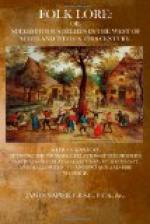There was another form of divining essentially an appeal to the lot, in which a stick was used, and which was frequently employed to determine matters of considerable importance. Boys resorted to it in their games in order to determine between two parties, to settle for example which side should take a certain part in a game, or which of two lads, leaders in a game, should have the first choice of associates. A long stick was thrown into the air and caught by one of the parties, then each alternately grasped it hand over hand, and he who got the last hold was the successful party. He might not have sufficient length of stick to fill his whole hand, but if by closing his hand upon the end projecting from his opponent’s hand, he could support the weight of the stick, this was enough.
The various methods of divining which are generally regarded as modern inventions, such as the many forms of divining by cards, the reading of the future from the position of the leaves of tea in a tea-cup, etc., we will pass by without comment, only remarking that the prevalence among us still of such superstitious notions shows that men, notwithstanding our boasted civilisation, are still open to believe in mysteries which, to common sense, are incredible, without exhibiting the slightest trace of scepticism, and without taking any trouble to investigate the truth of the pretensions, contenting themselves with a saying I have often heard—“Wonderful things were done of old which we cannot understand, and God’s hand is not yet shortened. He can do now what He did then.” And so they save themselves trouble of reasoning, a process which, to the majority, is disagreeable.
CHAPTER VIII.
SUPERSTITIONS RELATING TO ANIMALS.




